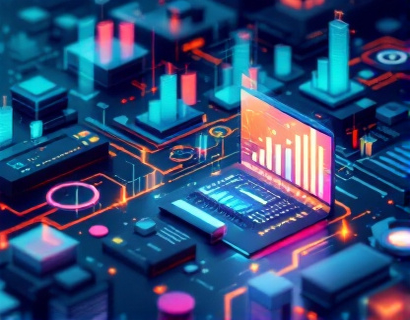Unleashing Next-Gen Digital Transformation: The Synergy of Crypto and AI
The intersection of cryptocurrency and artificial intelligence (AI) is giving birth to a new era of digital transformation, one that promises to redefine user experiences and reshape the digital landscape. This convergence is not just a technological curiosity but a powerful force that is enhancing service delivery and creating more efficient, intuitive interactions. For tech pioneers and early adopters, this fusion opens up a world of possibilities, offering unprecedented levels of seamlessness and innovation.
The integration of blockchain technology and AI is creating a synergy that amplifies the strengths of both fields. Blockchain provides a secure, decentralized, and transparent framework, while AI brings intelligence, adaptability, and efficiency. Together, they are paving the way for a more robust and user-centric digital ecosystem. This article delves into the cutting-edge integration of these advanced technologies, exploring how they are elevating interactions and service delivery to new heights.
Enhanced Security and Trust
One of the most significant benefits of combining crypto and AI is the enhancement of security and trust in digital transactions. Blockchain's inherent security features, such as immutability and cryptographic hashing, ensure that data is tamper-proof and transparent. AI, with its advanced analytics and machine learning capabilities, can detect and prevent fraudulent activities in real-time. This dual-layer approach creates a highly secure environment where users can transact with confidence.
For instance, AI-driven algorithms can monitor blockchain networks for unusual patterns or anomalies, flagging potential security threats before they become issues. Smart contracts, powered by AI, can automatically enforce contractual obligations and ensure compliance, reducing the need for intermediaries and minimizing the risk of human error. This synergy not only secures transactions but also builds trust among users, a critical factor in the adoption of new technologies.
Personalized User Experiences
The integration of AI in crypto applications is revolutionizing how users interact with digital services. AI algorithms can analyze vast amounts of data to understand user preferences and behaviors, enabling highly personalized experiences. In the context of cryptocurrency, this means tailored investment advice, customized portfolio management, and personalized notifications based on user-specific criteria.
For example, an AI-powered crypto assistant can monitor market trends, provide real-time alerts, and suggest optimal trading strategies based on a user's risk profile and investment goals. This level of personalization not only enhances user satisfaction but also increases the efficiency of service delivery. Users no longer have to sift through vast amounts of data; instead, they receive actionable insights that are relevant to their needs.
Streamlined Operations and Efficiency
The combination of blockchain and AI is also transforming the operational aspects of crypto services. AI can optimize various backend processes, from transaction processing to network management, ensuring that services run smoothly and efficiently. Blockchain's decentralized nature, when combined with AI's computational power, can handle complex tasks with minimal latency.
For instance, AI can predict and manage network congestion by dynamically adjusting resource allocation based on real-time demand. This proactive approach ensures that transactions are processed quickly and reliably, even during peak usage periods. Additionally, AI can automate routine tasks, such as data entry and report generation, freeing up human resources to focus on more strategic initiatives. This not only improves operational efficiency but also reduces costs, making crypto services more accessible and affordable.
Innovative Financial Products and Services
The synergy of crypto and AI is giving rise to a new generation of financial products and services that were previously unimaginable. These innovations are not only enhancing the functionality of crypto platforms but also opening up new avenues for financial inclusion and accessibility.
One such innovation is the development of AI-driven decentralized finance (DeFi) platforms. These platforms leverage blockchain's transparency and AI's analytical capabilities to create sophisticated financial instruments, such as automated market makers, lending protocols, and yield optimization tools. Users can access these services without the need for traditional financial intermediaries, reducing barriers to entry and democratizing financial opportunities.
Another exciting development is the creation of AI-enhanced digital assets. These assets can incorporate smart contract logic and real-time data feeds, allowing them to adapt to market conditions and user behaviors. For example, an AI-driven token could adjust its utility or value based on user interactions, providing a more dynamic and responsive financial instrument. This level of innovation is redefining the concept of digital assets and opening up new possibilities for investors and users alike.
Enhanced Data Analytics and Insights
AI's ability to process and analyze large datasets is a game-changer for crypto services. By integrating AI with blockchain, platforms can gain deep insights into user behavior, market trends, and transaction patterns. These insights can be used to refine services, improve user experiences, and drive business growth.
For instance, AI can analyze transaction data to identify patterns and trends that human analysts might miss. This can lead to more accurate market predictions, better risk management, and more effective marketing strategies. Additionally, AI can help in the development of predictive models that forecast market movements, enabling users to make more informed decisions. The combination of blockchain's data integrity and AI's analytical power creates a robust framework for data-driven decision-making.
Challenges and Considerations
While the integration of crypto and AI offers numerous benefits, it also comes with its own set of challenges and considerations. One of the primary concerns is the regulatory landscape. As crypto and AI technologies evolve, regulators are still grappling with how to oversee these innovations. Ensuring compliance with existing regulations while fostering innovation is a delicate balance that requires ongoing dialogue between stakeholders.
Another challenge is the technical complexity involved in integrating these technologies. Developing robust systems that can handle the computational demands of AI while maintaining the security and efficiency of blockchain requires expertise in multiple domains. Organizations must invest in skilled personnel and advanced infrastructure to overcome these technical hurdles.
Privacy is also a critical consideration. While blockchain's transparency is a strength, it can also raise concerns about data privacy. AI's data-processing capabilities must be balanced with robust privacy measures to protect user information. Implementing zero-knowledge proofs and other privacy-preserving techniques can help address these concerns, ensuring that users' data remains secure and confidential.
The Future of Digital Transformation
The convergence of crypto and AI is not just a current trend but a fundamental shift in the digital landscape. As these technologies continue to mature, we can expect even more innovative applications and use cases. The future holds the promise of even more seamless and intuitive interactions, further enhancing the user experience and driving digital transformation.
For tech pioneers and early adopters, embracing this synergy can lead to significant advantages. By staying at the forefront of these developments, they can leverage the power of crypto and AI to create groundbreaking solutions that redefine industries and set new standards for excellence. The journey ahead is exciting, and those who dare to explore this new frontier will be at the helm of the next digital revolution.










































